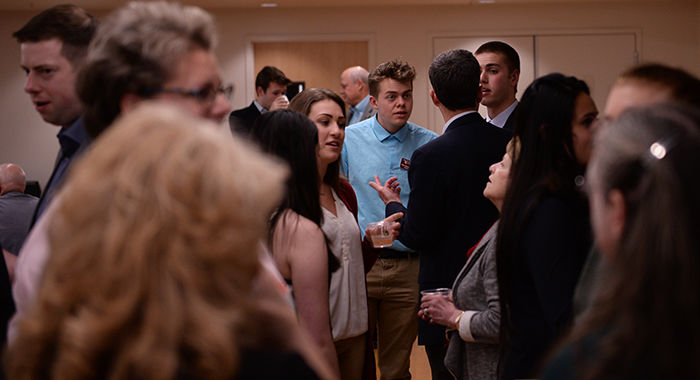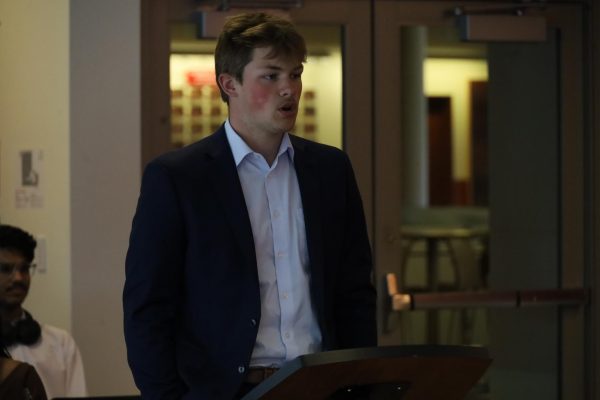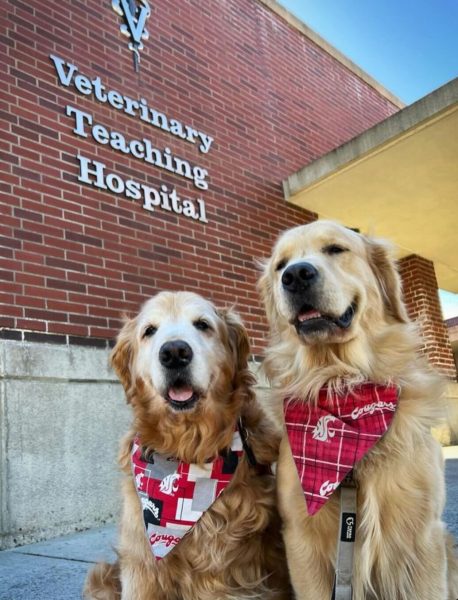Community leaders address safety, transportation
City council members and ASWSU senators mingle to discuss new ideas and projects for Pullman citizens and WSU students.
April 6, 2017
The City Council and ASWSU Senate met on Wednesday to address issues students face while living in Pullman, including student ambulance use and the impact of this year’s high snow levels.
“Pullman on average gets 30 to 36 inches of snow each year,” said Chris Boyan, assistant director of Transportation Services. “This year we got over 60 inches, or twice that amount.”
Pullman Police Chief Gary Jenkins said College Hill was an area of problems this winter and a place that city officials will focus on in the future. Residents experienced packed snow and ice as well as numerous parked cars narrowing the roadways.
“It’s something we want to address, but we want to adequately deal with student concerns as well,” Jenkins said.
John Shaheen, director of Transportation Services, said the Delta Delta Delta sorority always kept its sidewalks clean and free of snow this winter. Shaheen recognized the few members of the sorority in attendance at the meeting.
“[Delta Delta Delta] should challenge the Greek community to lead on in the snow removal of the sidewalks,” Shaheen said. “Greek Row is known for its philanthropic work. What would be more benevolent than to clear off the sidewalks for their fellow students?”
Pullman Fire Chief Mike Heston said he is in support of an increase in student fees to provide free ambulance services for students. The student body would likely have to approve the increase and determine the exact amount of the fee, Heston said.
He said an ambulance ride to the hospital costs individuals around $800 to $1,000. The proposed fee would alleviate this cost and allow the Pullman Fire Department to respond to student needs across Pullman more effectively, Heston said.
“Public safety costs go up and up every year because between 800 to 1,000 students use this service,” Heston said. “We are always looking for ways to fund the fire department and make sure students stay safe their whole career [at WSU].”
Sen. Savannah Rogers and Sen. Lindsay Schilperoort introduced “Cougs Feeding Cougs”, a program they helped establish on campus. Through the program, students with less than $10 of both RDA and Cougar Cash combined can ask for $10 per day to pay for food from on-campus sources.
“This program was created so students can donate to other students,” Rogers said. “It’s said that during college you are supposed to dig deep and eat Ramen Noodles for four years, but it doesn’t, and shouldn’t, have to be like that.”
Rogers said 52.3 percent of Pullman residents live below the poverty line and some of those do not know where their next meal will come from. She said it is impossible for students to focus on schoolwork when they are hungry. Unless the program receives more funding, it will not continue past this year, Rogers said.
“If there’s no money in the pot, this program dies,” she said.
The groups discussed ways in which they will work to increase student safety going to and from Pullman. Pullman Mayor Glenn Johnson said that by 2019, the Pullman-Moscow airport runway will have been rotated, widened, and extended to accommodate larger planes.
“Over 120,000 people are using the airport, which is a good thing,” Johnson said. “We would like to continue to encourage people to use the airport [going forward].”
Editor’s note: This article has been revised to reflect the proper spelling of the Pullman mayor’s name. It is Glenn Johnson, not Gary Johnson.




















